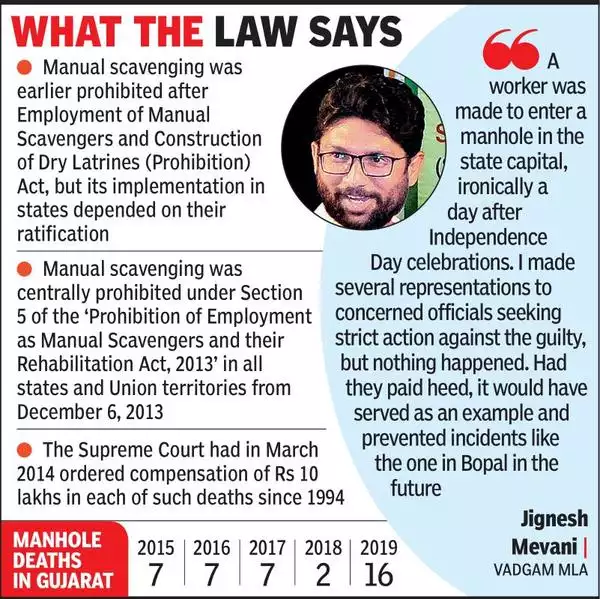Ahmedabad
(Head Office)Address : 506, 3rd EYE THREE (III), Opp. Induben Khakhrawala, Girish Cold Drink Cross Road, CG Road, Navrangpura, Ahmedabad, 380009.
Mobile : 8469231587 / 9586028957
Telephone : 079-40098991
E-mail: dics.upsc@gmail.com

Manual Scavenging
News: According to the Union Ministry of Social Justice and Empowerment (MoSJ&E), only 508 districts out of the total 766 in the country have declared themselves manualscavenging free.
What is Manual Scavenging?
Manual Scavenging is lifting of human excreta from unsanitary latrines as defined in Section 2 (1) (g) of the “Prohibition of Employment as Manual Scavengers and Rehabilitation Act 2013”
As many as 58,000 people worked as manual scavengers as of 2018. 941 people have died since 1993 due to accidents while undertaking hazardous cleaning of sewer and septic tanks.
Salient features of Prohibition of Employment as Manual scavengers and Rehabilitation Act, 2013:
It bans manual scavenging and it widened the definition of manual scavengers by including it in all forms of manual removal of human excreta.
It lays a key focus on rehabilitating the manual scavengers by organizing training programs (at a stipend of Rs. 3000) and offering scholarships to their children.
It makes the offence of manual scavenging cognizable and non-bailable.
It makes it obligatory for employers to provide protective tools to the workers.
What other steps have been taken to tackle Manual Scavenging in India?
Swacchta Abhiyaan App – It works on creating database to map unsanitary latrines and identify manual scavengers who needs rehabilitation.
Safai-Mitra Suraksha Challenge – To be carried out across 243 cities where sewer and septic tanks will be mechanized.
In the Safai Karamchari vs Union of India, 2014 the SC ruled that continuance of manual scavenging in India is blatant violation of Article 17 of the Constitution of India by which untouchability is abolished and its practice is forbidden in any form.
National Action Plan for Mechanized sanitation ecosystem (NAMASTE scheme) – It was launched to promote 100% mechanization, specially cleaning of sewers, septic tanks, desilting of drains, garbage lifting etc. In Budget 2023, the government allotted 100 crores for the scheme.
Way Forward
Despite existing laws that bans Manual scavenging and initiatives that cater to concerns of manual scavengers, the menace of manual scavenging still exists in India.
Skill training and rehabilitation of workers is restricted on papers. The need of the hour is all local bodies must identify and profile all septic tank/sewer workers in their respective areas, provide them with training and safety equipments.

Address : 506, 3rd EYE THREE (III), Opp. Induben Khakhrawala, Girish Cold Drink Cross Road, CG Road, Navrangpura, Ahmedabad, 380009.
Mobile : 8469231587 / 9586028957
Telephone : 079-40098991
E-mail: dics.upsc@gmail.com
Address: A-306, The Landmark, Urjanagar-1, Opp. Spicy Street, Kudasan – Por Road, Kudasan, Gandhinagar – 382421
Mobile : 9723832444 / 9723932444
E-mail: dics.gnagar@gmail.com
Address: 2nd Floor, 9 Shivali Society, L&T Circle, opp. Ratri Bazar, Karelibaugh, Vadodara, 390018
Mobile : 9725692037 / 9725692054
E-mail: dics.vadodara@gmail.com
Address: 403, Raj Victoria, Opp. Pal Walkway, Near Galaxy Circle, Pal, Surat-394510
Mobile : 8401031583 / 8401031587
E-mail: dics.surat@gmail.com
Address: 303,305 K 158 Complex Above Magson, Sindhubhavan Road Ahmedabad-380059
Mobile : 9974751177 / 8469231587
E-mail: dicssbr@gmail.com
Address: 57/17, 2nd Floor, Old Rajinder Nagar Market, Bada Bazaar Marg, Delhi-60
Mobile : 9104830862 / 9104830865
E-mail: dics.newdelhi@gmail.com